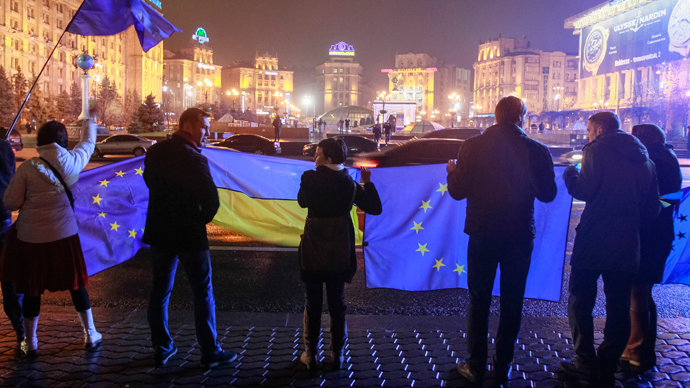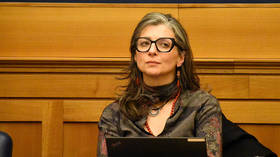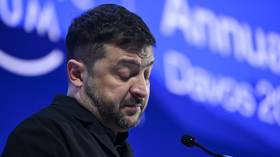Ukraine refused to ‘sign a suicide note’, sending the EU’s ‘geopolitical project’ onto the rocks

Joining an old European geopolitical and ideological project would have been catastrophic for the Ukrainian economy, political expert John Laughland told RT, noting that it was actually the EU, not Russia, blackmailing Ukraine into signing a suicide note.
RT:The European foreign policy chief Catherine Ashton
says Ukraine's U-turn is indeed a major disappointment. Who is
the biggest loser here - Ukraine or the EU?
John Laughland: The biggest loser here is the EU because the
EU has conceived this Association Agreement, like all the other
agreements that it tries to sign with the former Eastern European
states, as a geopolitical project. It is very important to
understand that in the midst of all the accusations against
Russia it is actually the EU which sees Eastern expansion as a
geopolitical and indeed an ideological project.
We saw this back in September when Armenia, which of course in
comparison to Ukraine is a tiny country and therefore is mostly
below people’s radar screens; Armenia signed up for the customs
union with Russia and the other members of the customs union of
the customs union between Russia, Kazakhstan, and Belarus and so
on. And immediately Brussels said that any possibility of it
signing an Association Agreement with the EU was off the table.
So the EU back in September made it clear that you either have to
sign an EU agreement or you had to sign the Russian one. If you
wanted to sign the Russian one, you would not be allowed to sign
the European one. And that is because it has been pursuing now,
for 20 years as a European Union, as I say, geopolitical,
ideological project of ever further integration. And that is what
just hit the rocks today.
RT:What do you make of President Putin's statement
that the EU “blackmailed” and “pressured” Ukraine over the trade
pact suspension?

JL: He is absolutely right. All the Western press are
accusing him of blackmail but he is absolutely right. That is
what I have just said about Armenia. They’ve told Armenia that
all chance of signing an agreement with them is off the table as
soon as they sign the customs agreement. And that message was
obviously meant for Ukraine. We have to see this in the context
of geopolitical projects.
It is no coincidence that all of the EU’s chief envoys,
ambassadors and rapporteurs on this Ukrainian issue have been
Poles. They have been Polish citizens. Former President of Poland
Aleksander Kwaśniewski, was the special envoy, the EU’s
ambassador to Kiev is Polish. This is an old geopolitical dream
of Poland, which has always regarded Ukraine as its back yard.
And there is no other way to see this. It did not need to be like
this however. This is, after all, only a trade agreement. And
where I think Ukraine has been very clever, I think one has to
give credit to Yanukovich on this, is that he has offered a three
way talk, a tripod discussion between Ukraine, the EU and Russia.
His government always said it wants to be a bridge between the EU
and Russia. And that amiably reasonable proposal has been angrily
rejected by the EU, because precisely the geopolitical project
consists in forcing Russia as far out of European affairs as
possible.
RT:Would this trade deal with the EU help Ukraine's
economy, which is experiencing hard times right now?
JL: It would have finished it off. It would have been a
coup de gras to an economy which is already very weak. And I’m
not just saying that out of polemical reasons. Anybody who has
followed the sad story, very sad, and in some cases catastrophic
story of the Eastern European economies as I have in the 1990s
and 2000s, I’m thinking especially of countries in the Balkans,
weaker countries like Bulgaria and Romania. But also now
countries like Greece and Cyprus. Anybody who has followed the
history of those countries over the last 15-20 years can see how
signature of this agreement and indeed the preparation for the
signature is absolutely catastrophic for the economies, because
the industries can’t stand up to the competition, because EU
regulation is too costly for these weaker economies and because
their natural markets are in the East, particularly with Russia.
It would have been signing a suicide note.
The statements, views and opinions expressed in this column are solely those of the author and do not necessarily represent those of RT.












